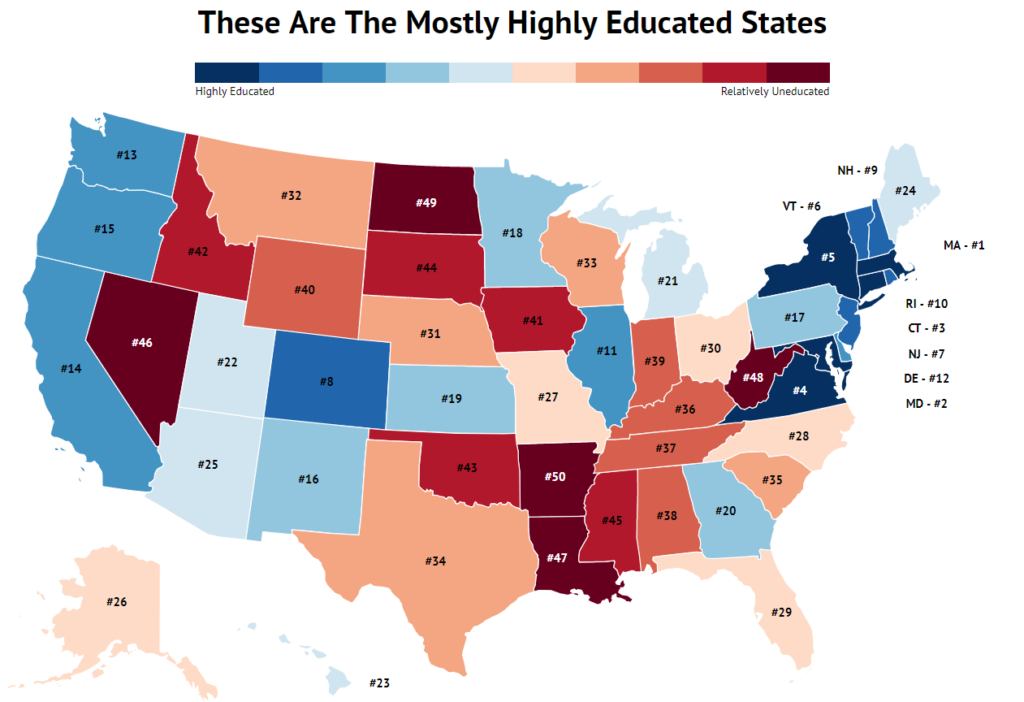Texas has been making significant strides in its education system, with a strong focus on improving its educational standards and outcomes. The state has witnessed a remarkable increase in the number of college graduates over the past decade, leading many to question whether Texas has claimed the title of the most educated state in the USA. This article delves into the factors contributing to Texas’ educational success, exploring the initiatives that have been implemented and assessing the validity of its claim to this prestigious title.

This image is property of www.zippia.com.
Educational Attainment in Texas
Texas, the second-largest state in the United States, places importance on educational attainment to drive social and economic development. An analysis of educational attainment in Texas reveals the state’s progress in providing educational opportunities across various levels of education and demographic groups.
Overall Educational Attainment
When considering the overall educational attainment in Texas, it is noteworthy that the state has made significant strides in recent years. According to data from the U.S. Census Bureau, 29.2% of Texas residents aged 25 and older hold a bachelor’s degree or higher, which is slightly lower than the national average of 32%.
Educational Attainment by Level
Examining educational attainment by level in Texas reveals a mixed picture. At the bachelor’s degree level, Texas surpasses the national average, with 27% of residents holding a bachelor’s degree compared to the national average of 19.6%. However, when it comes to advanced degrees like master’s or doctoral degrees, Texas falls slightly below the national average.
Educational Attainment by Demographic Groups
Educational attainment in Texas varies among different demographic groups. While the state demonstrates improvement in closing educational gaps, disparities still exist. White and Asian residents tend to have higher educational attainment levels compared to Hispanic and African American residents. Efforts to address these disparities and promote educational equity remain an ongoing focus.
Comparison to Other States
To gauge the educational progress in Texas accurately, it is essential to compare the state’s performance to other states in the nation. By examining Texas’ position in relation to the national average and comparing it to top-ranked states and neighboring states, we can gain insights into where Texas stands.
Texas vs. National Average
When compared to the national average, Texas lags slightly in terms of overall educational attainment. However, considering the size and diversity of Texas, the state has made commendable progress in providing educational opportunities across its vast population.
Texas vs. Top-Ranked States
When contrasting Texas with top-ranked states in terms of educational attainment, there is certainly room for improvement. While states like Massachusetts, New Hampshire, and Connecticut boast the highest levels of educational attainment, Texas is still striving to reach similar heights.
Texas vs. Neighboring States
In comparison to its neighboring states, Texas fares reasonably well in terms of educational attainment. It outperforms some neighboring states in certain metrics, indicating that the state has placed a significant focus on educational development.

This image is property of thumbnails.texastribune.org.
Factors Affecting Educational Attainment
Several factors contribute to educational attainment levels in Texas. Examining the quality of schools and universities, access to education, education funding, and economic factors offers insights into the influences on educational outcomes.
Quality of Schools and Universities
The quality of schools and universities plays a vital role in educational attainment. Texas boasts numerous renowned educational institutions that offer rigorous academic programs. However, disparities in the quality of education among different districts and schools within the state remain a challenge.
Access to Education
Ensuring equal access to education for all residents is crucial for improving educational attainment. Texas has made efforts to expand access to education through initiatives like online learning, dual-credit programs, and workforce development partnerships. However, disparities in access still exist, particularly in rural areas where resources may be limited.
Education Funding
Education funding significantly impacts the quality of education and educational outcomes. Texas has faced challenges in adequately funding its education system. While the state has made efforts to address this issue, continued investment in education remains imperative.
Economic Factors
Socioeconomic factors, such as poverty rates and economic inequality, can influence educational attainment. Texas faces economic disparities that can impact access to quality education, particularly for disadvantaged communities. Addressing these disparities and providing resources to ensure educational equity for all students is essential.
Higher Education in Texas
Higher education plays a critical role in fostering innovation, research, and intellectual growth. Texas has a significant number of colleges and universities, encompassing both public and private institutions.
Number of Colleges and Universities
Texas boasts an extensive higher education system, with over 170 colleges and universities spread across the state. This diverse range of institutions provides various academic and vocational opportunities for students.
Top-Ranked Universities in Texas
Several universities in Texas have gained recognition for their academic excellence and research contributions. The University of Texas at Austin, Texas A&M University, and Rice University are just a few examples of institutions that consistently rank highly in national and international university rankings.
Graduation Rates
Tracking graduation rates is crucial to understanding the success of higher education institutions. Texas has seen improvements in graduation rates in recent years. However, continued efforts are needed to ensure students have the necessary support and resources to complete their degrees.
Availability of Advanced Degrees
Texas offers a wide array of advanced degree programs, including master’s and doctoral programs. These programs contribute to the state’s intellectual capital and play a key role in attracting talent and fostering innovation.
This image is property of i.insider.com.
K-12 Education in Texas
A strong K-12 education system is vital for preparing students for higher education and future success. Texas’s education landscape includes both public and private schools, as well as charter schools.
Public School System
The Texas public school system serves a vast and diverse student population. Efforts have been made to improve the quality of education, enhance curriculum standards, and provide additional resources to support student achievement.
Private and Charter Schools
In addition to public schools, Texas is home to numerous private and charter schools. These schools offer alternative educational options and cater to diverse learning needs. However, disparities in access and quality can still exist between public and private schools.
Quality of Education
Ensuring a high-quality education for every student is a priority for Texas. The state has implemented various initiatives to improve educational quality, such as accountability systems, teacher professional development programs, and curriculum enhancements. However, ongoing efforts are necessary to address disparities and raise overall educational standards.
Achievement Gaps
Achievement gaps remain a significant challenge in Texas K-12 education. These gaps often disproportionately affect economically disadvantaged students, English language learners, and students with disabilities. Strategies focusing on equity and targeted support for underperforming student groups are essential for addressing these gaps.
Education Policies and Initiatives in Texas
Texas has implemented various education policies and initiatives to improve educational outcomes and close achievement gaps across the state.
State Education Policies
Texas has enacted policies aimed at improving student performance, enhancing teacher quality, and increasing accountability within the education system. Initiatives like the Texas Education Agency’s A-F Accountability System and the implementation of rigorous curriculum standards reflect the state’s commitment to educational improvement.
College Readiness Initiatives
To enhance college readiness, Texas has implemented programs like Advanced Placement (AP) courses, dual-credit programs, and college and career counseling. These initiatives aim to provide students with the necessary skills and support to succeed in post-secondary education.
Efforts to Close Educational Gaps
Addressing educational gaps remains a top priority for Texas. The state has implemented targeted interventions, such as the Texas GEAR UP program, which aims to increase college access and success for low-income students. Continued efforts are crucial to ensure equal educational opportunities for all students.
This image is property of assets3.thrillist.com.
Challenges and Opportunities
While Texas has made significant progress in its education system, several challenges persist. Addressing these challenges and embracing opportunities is essential for improving educational outcomes and fostering future success.
Economic Disparities
Economic disparities can significantly impact educational attainment. Texas faces challenges related to income inequality, poverty rates, and access to resources, particularly in economically disadvantaged areas. Recognizing and addressing these disparities is vital for ensuring educational equity.
Educational Equity
Achieving educational equity is a continuous challenge. Texas must focus on providing equal access to high-quality education for all students, regardless of their socioeconomic background, race, or ethnicity. This requires targeted strategies, resource allocation, and community engagement.
Teacher Shortages
Like many states, Texas faces a shortage of qualified teachers in certain subject areas and geographic regions. Addressing teacher shortages requires attracting and retaining highly qualified educators, providing competitive salaries, and offering professional development opportunities.
Impact of COVID-19
The COVID-19 pandemic has undoubtedly had a significant impact on education in Texas. School closures, remote learning challenges, and disruptions in educational progress have presented new obstacles. Addressing the long-term effects of the pandemic on educational attainment will be a priority moving forward.
Community and Parental Involvement
Community support and parental engagement play a crucial role in promoting educational success and creating a supportive learning environment.
Importance of Community Support
Community engagement and support are essential in bolstering educational outcomes. Collaborative efforts between schools, families, and community organizations can provide additional resources, mentorship, and enrichment opportunities for students.
Parental Engagement in Education
Parental involvement is a vital component of educational attainment. When parents are actively engaged in their children’s education, it has a positive impact on academic performance, school attendance, and overall educational achievement. Texas encourages parental involvement through various initiatives and programs.
Role of Extracurricular Activities
Extracurricular activities play a vital role in a well-rounded education. Involvement in sports, arts, clubs, and other activities promotes social skills, teamwork, and personal development. Encouraging a robust extracurricular environment can contribute to the overall educational experience for Texas students.

This image is property of public.tableau.com.
Implications for Texas
The educational attainment levels in Texas have wide-ranging implications for the state’s future social, economic, and cultural development.
Benefits of an Educated Population
An educated population offers numerous benefits to the state. Higher educational attainment is associated with increased earning potential, improved job prospects, and reduced rates of poverty. A well-educated workforce also attracts businesses, drives innovation, and contributes to economic growth.
Economic Growth and Innovation
Investing in education and fostering a highly skilled workforce is crucial for economic growth and innovation. Texas’s commitment to improving educational attainment contributes to the state’s ability to attract businesses, support entrepreneurship, and maintain a competitive edge in today’s knowledge-based economy.
Social and Cultural Development
Education plays a pivotal role in social mobility and cultural development. Higher levels of educational attainment can lead to reduced social inequalities and contribute to the overall well-being of communities. Texas’s focus on educational attainment aligns with the state’s vision of creating a prosperous and inclusive society.
Conclusion
While Texas may not currently hold the title of the most educated state, it has made significant strides in improving educational attainment levels. Through efforts focused on increasing access to education, closing achievement gaps, and implementing policies and initiatives to enhance educational quality, Texas has taken positive steps to provide opportunities for its diverse population. Continued dedication to addressing challenges such as economic disparities, teacher shortages, and the impact of the COVID-19 pandemic will be crucial for Texas to further elevate its ranking among the most educated states. By embracing the opportunities presented by an educated population, Texas can position itself as a leader in economic growth, innovation, and social progress.

